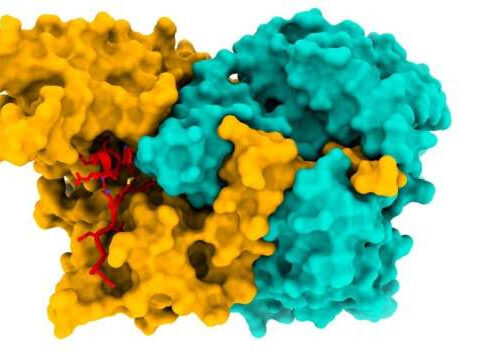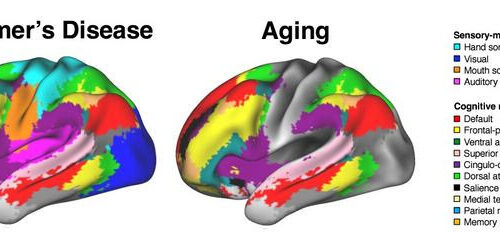by European Synchrotron Radiation Facility The structure of the ACAD9-ECSIT_CTER complex (ECSIT in red). An international team of researchers, led by the ESRF, have elucidated the structure of the ACAD9-ECSIT_CTER complex, by using cryo-EM techniques. This complex is important in the correct functioning of the energy-producing machinery in mitochondria. Credit: ESRF/M. Soler López. Credit: ESRF/M. Soler...
Category: <span>Alzheimer’s</span>
Alzheimer’s Disease Evading Patient Offers Clues on Breaking Amyloid, Tau Link
Credit: KATERYNA KON/SCIENCE PHOTO LIBRARY/Getty Images When one member of a large Colombian family, plagued by Alzheimer’s disease for generations, evaded the disease (staying cognitively healthy into her 70s) despite inheriting the genetic mutation that caused her relatives to develop dementia in their 40s, researchers sought to understand why. The Colombian patient carried the presenilin-1...
Clues to preventing Alzheimer’s come from patient who evaded disease, despite genetics
by Washington University School of Medicine Credit: Cell (2023). DOI: 10.1016/j.cell.2023.11.029 Alzheimer’s disease has plagued one large Colombian family for generations, striking down half of its members in the prime of life. But one member of that family evaded what had seemed would be fate: Despite inheriting the genetic defect that caused her relatives to develop...
Light therapy may improve symptoms of Alzheimer’s disease
by Public Library of Science The research suggests that light therapy may be a promising treatment option for patients with Alzheimer’s disease. Credit: Rad Cyrus, Unsplash, CC0 (creativecommons.org/publicdomain/zero/1.0/) Light therapy leads to significant improvements in sleep and psycho-behavioral symptoms for patients with Alzheimer’s disease, according to a new study published in PLOS ONE by Qinghui Meng...
Alzheimer’s research: New study uncovers previously unknown processes in fat metabolism
Peer-Reviewed Publication SAARLAND UNIVERSITY A STUDY LED BY PROFESSORS MARCUS GRIMM (PHOTO) AND TOBIAS HARTMANN AT THE RHINELAND CAMPUS OF THE SRH UNIVERSITY OF APPLIED HEALTH SCIENCES IN LEVERKUSEN AND AT SAARLAND UNIVERSITY HAS SHED LIGHT ON A BIDIRECTIONAL INTERACTION IN THE BODY’S FAT METABOLISM THAT COULD PLAY AN IMPORTANT ROLE IN THE DEVELOPMENT OF...
Center Maps New Path for Alzheimer’s Prevention and Treatment
The new brain center will focus on research translating genetic, metabolic and molecular insights into interventions that protect those at risk before brain changes set in. The medical community can foresee a looming increase in Alzheimer’s disease, the most common form of dementia, as the population ages. The number of Americans affected is projected to...
Research finds sex differences in immune response and metabolism drive Alzheimer’s disease
by Cleveland Clinic Credit: CC0 Public DomainCleveland Clinic researchers analyzed genes and brain tissue of patients with Alzheimer’s and found that differences in brain immunometabolism—the interactions between the immune system and the ways cells create energy—may contribute to women’s increased risk for the disease and its severity. The findings, published in Alzheimer’s and Dementia, offer...
Study reveals broader impact of Alzheimer’s on brain function
UNIVERSITY OF TEXAS AT DALLAS IMAGE: ALZHEIMER’S DISEASE AND AGING ARE ASSOCIATED WITH DISTINCT PATTERNS OF BRAIN NETWORK DISRUPTION. ALZHEIMER’S (LEFT) EXERTS WIDESPREAD IMPACTS ON BRAIN CONNECTIVITY, DISRUPTING BOTH HIGHER ORDER COGNITIVE NETWORKS AND SENSORY AND MOTOR NETWORKS. IN CONTRAST, HEALTHY AGING (RIGHT) IS LIMITED TO DISRUPTION OF COGNITIVE NETWORKS AND SPARES SENSORY AND MOTOR...
Researchers find the roots of tau tangles in Alzheimer’s disease
by Bill Hathaway, Yale University Credit: Pixabay/CC0 Public Domain An experimental drug can reduce the toxic changes in tau proteins known to damage neurons in brains with Alzheimer’s disease, researchers from Yale School of Medicine and Johns Hopkins University report. While much research related to Alzheimer’s disease has concentrated on identifying ways to reduce the buildup...
Enhanced Natural Killer Cell Therapy Shows Promise in Alzheimer’s
Megan Brooks November 02, 2023 An investigational natural killer cell (NK) therapy has shown promise in the treatment of Alzheimer’s disease (AD), in a small phase 1 proof-of-concept clinical trial. SNK01, being developed by NKGen Biotech, is an autologous, nongenetically modified NK cell product that has enhanced cytotoxicity and activating receptor expression. “When we give these enhanced...





